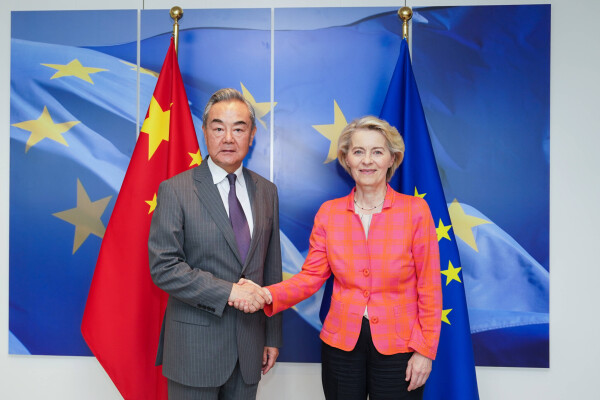EU-China Summit Collapses in One Day Over Trade Disputes and Human Rights Issues
The highly anticipated EU-China summit, initially scheduled to span from July 24th to July 27th, concluded abruptly after just one day of discussions. The summit aimed to address critical trade relations and geopolitical tensions, but talks quickly reached an impasse as European leaders reiterated their demands for respect for international law and human rights, particularly in light of China"s growing support for Russia amidst the Ukraine conflict.
Background & Context
The EU-China relationship has long been fraught with complexities, shaped by a myriad of economic, political, and social factors. The European Union, as one of the largest economic blocs in the world, seeks to engage with China, the EU"s largest supplier of goods, which accounts for 21.3% of its imports. However, this engagement is tempered by significant concerns regarding human rights abuses, trade competition, and geopolitical alliances. The recent summit was intended to serve as a platform for addressing these issues, yet it quickly devolved into a contentious exchange over differing values and priorities.
At the heart of the discussions was China"s alignment with Russia, particularly its stance on the ongoing invasion of Ukraine. EU diplomatic chief Kaja Kallas had previously confronted Chinese Foreign Minister Wang Yi, who firmly stated that China would not abandon its alliance with Russia. This position has become a pivotal factor influencing EU-China relations, with Brussels emphasizing that cooperation must be predicated on adherence to international norms and the rule of law.
Key Developments
As the summit unfolded, EU leaders raised a multitude of pressing issues, including the competitive threat posed by China"s burgeoning auto industry, opaque export controls on rare earth metals, and ongoing tensions regarding Taiwan. Ursula von der Leyen, President of the European Commission, issued a stern warning to Beijing, emphasizing that failure to address these concerns would lead to "consequences." This assertive stance underscores the EU"s frustration with China"s perceived intransigence on critical matters of international importance.
The only point of agreement reached during the summit was a mutual commitment to uphold the Paris Agreement on climate change, reflecting a shared recognition of the global climate crisis. However, this consensus was overshadowed by the broader failures of the discussions, as no substantive progress was made on the core issues that have long plagued EU-China relations.
\n\n
Image for EU-China Summit Collapses in One Day Over Trade Disputes and Human Rights Issues
Broader Impact
The collapse of the summit has significant implications for both the EU and China. For Brussels, the failure to align China with its values represents a stark reminder of the challenges inherent in engaging with a nation that prioritizes its strategic interests over international norms. Analysts suggest that this setback may embolden China to further consolidate its position in European markets, potentially displacing European industries that are already struggling under the weight of stringent regulations aimed at environmental sustainability.
Furthermore, the lack of a coherent strategy within the European Commission, Council, or Parliament to counteract China"s market dominance raises concerns about the future viability of European industries. As Europe grapples with the dual pressures of climate change regulations and competitive displacement by Chinese manufacturing, the question of how to maintain economic resilience becomes increasingly urgent. The situation parallels other geopolitical tensions, such as the recent developments in the Gaza crisis, where international relations are similarly strained and complex.
What"s Next
Looking ahead, the EU faces a critical juncture in its approach to China. The failure of the summit may compel European leaders to reassess their strategies regarding trade and diplomatic engagement with Beijing. As China continues to solidify its foothold in the European market, the EU must navigate the delicate balance between competitive economic interests and the imperative to uphold human rights and international law.
Future meetings and dialogues will likely focus on establishing clearer frameworks for trade that incorporate human rights considerations while addressing the competitive landscape. Additionally, the EU may need to explore new avenues for collaboration on global challenges, such as climate change, without compromising its core values. As the geopolitical landscape evolves, the EU"s ability to adapt and respond effectively will be crucial in determining its future relationship with China.

Image for EU-China Summit Collapses in One Day Over Trade Disputes and Human Rights Issues


![[Video] Heavy clashes and gunfire reported in Baghdad, Iraq](/_next/image?url=%2Fapi%2Fimage%2Fthumbnails%2Fthumbnail-1768342239932-848qsh-thumbnail.jpg&w=3840&q=75)




![[Video] Gunfire between Iraqi security forces and Sadr militias in Baghdad](/_next/image?url=%2Fapi%2Fimage%2Fthumbnails%2Fthumbnail-1768343508874-4redb-thumbnail.jpg&w=3840&q=75)
